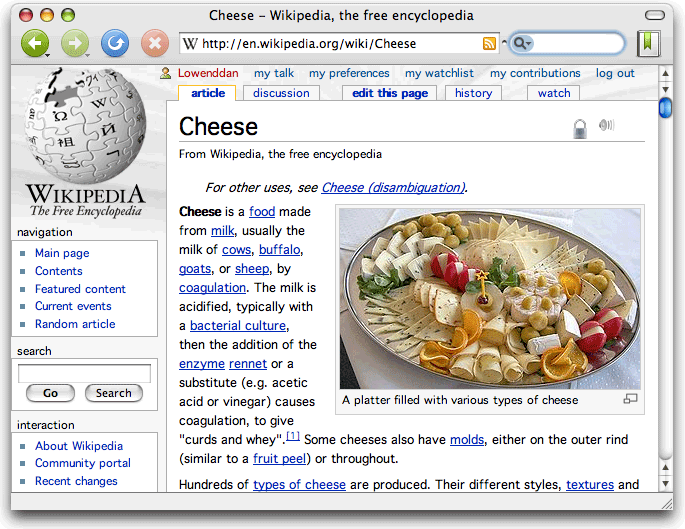One of the most vexing software issues associated with running
elderly Mac hardware is web browsers, especially as we get drawn more
and more into the
"cloud".
Being still stuck with dialup Internet, I resisted switching my
email activity to webmail for a long time, but the convenience of
Gmail, which works with tolerable (albeit not scintillating) speed on
dialup so long as you specify "Basic HTML" mode, has gradually roped me
in, and it seems that I become more and more dependent upon Google for
information retrieval with every passing day.
Web-based productivity software (e.g.: most online Google apps) run
too sluggishly on dialup to be a practical proposition for me, but once
I get broadband (promised here for later this year), I'll probably
begin using them as well.
Anyway, for all of this web work, you need a good browser, and with
my slow connection bottleneck, the faster the better. The problem is
that most browsers are freeware (actually, that's not really a
problem!), so there is little incentive for developers to invest time
and energy maintaining backward compatibility for any but current or
very recent OS versions and hardware.
Classic Mac OS holdouts have been struggling with this reality for
some time now, and there is no really up-to-date browser available for
Macs running OS 9 or earlier. Browser support is still very good
for PowerPC machines running recent versions of OS X, with most
major browsers remaining compatible with at least OS X 10.4
"Tiger" - and sometimes even 10.3 "Panther".
However, support of older version of the Mac OS is not comprehensive
- for example, the new indie WebKit based browser Cruz, which features multiple page views
within a single browser window or tab and a plugin architecture
intended to facilitate easy feature additions, requires a Mac OS X
10.5 "Leopard".
Firefox Pros and Cons
More subtly, I've found that Firefox 3.x, which works
great with my 17"
PowerBook G4 running OS X 10.5, even though it nominally
supports OS X 10.4, is not a happy camper on my 550 MHz G4
upgraded Pismo
PowerBook, running sluggishly with a lot of hard disk activity,
and, worse, seeming to slow down other web applications as well when
it's running. I can't say what the cause of this is, but the behavior
has persisted through several version updates, causing me to revert
back to Netscape
Navigator 9, which I've found very reliable on that system
setup.
What I miss when using Navigator 9 is the improved load speed of the
later Gecko browser engine versions and "session saving" - remembering
what pages you were visiting when you quit and automatically loading
them the next time you start - which I've become addicted to, and which
is a major time and aggravation-saver when I reboot.
Camino
One workaround I experimented with was Camino, the Mac-only Cocoa interface
browser that also uses Mozilla's Gecko engine, but which happily does
not manifest the slowdown issues that plague Firefox 3 on my old, slow,
somewhat memory-challenged Pismo. The Mac-themed interface is pleasant
to work with as well.

The problem with Camino has been that it seems to not be entirely
comfortable with dragging text from the OS 9 applications that I
still use for production work on that computer (in OS X Classic
Mode) into web page forms, something that I do a lot of with web
posting or, even more tiresome, it's cranky about answering clicks on
its interface windows to bring it forward, especially when coming from
Classic Mode applications.
However, I can happily report that these the issues seem to have
been improved to a considerable degree in the latest Camino release
(version 1.6.6 ), enough that I may finally have switched from
Navigator 9. The functional advantages are that Camino is significantly
quicker loading pages and supports session restores.
Camino 1.6.6, which upgrades to version 1.8.1.19 of the Mozilla
Gecko rendering engine and includes several critical security and
stability fixes, was released on December 16, at which time I
downloaded it, but I never got around to installing and checking it out
until last weekend.
The page clicking issue especially seems significantly improved.
Dragging and dropping in text is still not as well (or at least
quickly) received as it is in Navigator 9, but I consider that a
tolerable tradeoff for the page speed and not having to manually
restore sessions after a reboot. Cool.
It's early days yet, but so far I'm a lot happier with Camino than I
was.
Changes in Camino 1.6.6 from version 1.6.5:
- Upgraded to version 1.8.1.19 of the Mozilla Gecko rendering engine,
which includes several critical security and stability fixes.
- Upgraded the "Block flash animations" code to use Flashblock
1.5.7.
- Improved ad-blocking.
Complete Camino 1.6.x changelog: http://caminobrowser.org/releases/1.6.6/
For a full list of Camino 1.6.x features, visit: http://caminobrowser.org/releases/1.6/complete.php
System Requirements
- Mac OS X 10.3.9 or later
- Camino 1.6 is a universal binary and runs natively on both PowerPC-
and Intel-based Macs.



